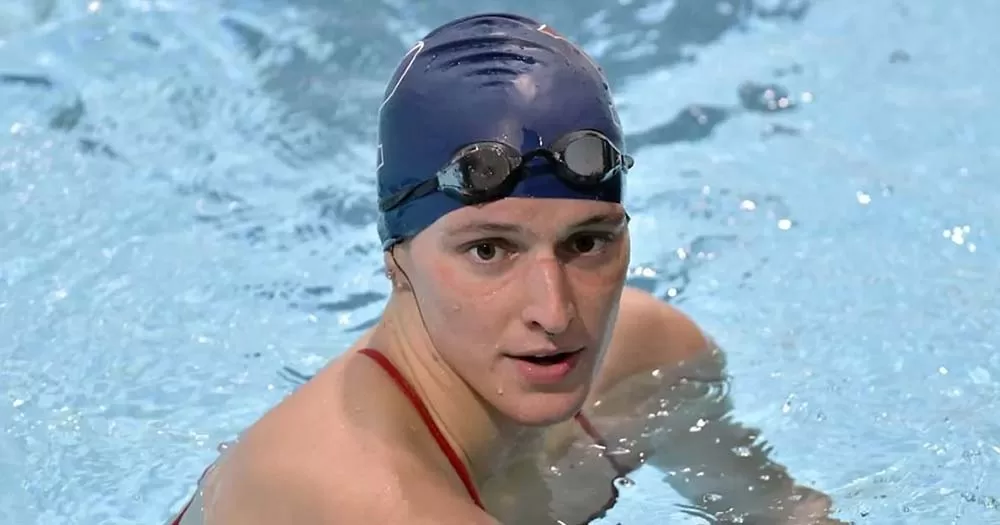Competitive swimmer Lia Thomas is taking legal action against World Aquatics in hopes of overturning the organisation’s ban on transgender women competing in female categories.
World Aquatics is the global body overseeing competitive swimming events. In June 2022, after Thomas became the first trans woman to earn a national swimming title, the organisation changed its rules to prohibit anyone who has experienced “any part of male puberty” from competing in women’s competitions.
Prior to this ruling, transgender women could compete in the female category if they lowered their testosterone levels within a specific range.
World Aquatics now claims that transgender women who experienced male puberty have physical advantages in their endurance, strength and lung size compared to cisgender women, even after reducing their testosterone levels through medication, but this research is not conclusive.
A report commissioned by the Canadian Centre for Ethics in Sport, which examined medical findings, testosterone effects on the body, and myths about transgender athletes, found that trans women have no inherent advantage over their cisgender counterparts in elite sport, and most criticism of transgender women in sport is rooted in transphobia and misinformation.
“New literature review does not support Bans on Transgender Women Athletes”.
The Canadian Centre for Ethics in Sport detailed 87 page document released today ⤵️ https://t.co/mNg5q8KqWu
— Sandy ??❤ ?️? Ally She/Her ????????? (@sullivansa1) November 3, 2022
Thomas competed on the University of Pennsylvania’s men’s swim team for three years prior to beginning her transition journey in 2019. In 2022, Thomas said, “The biggest misconception, I think, is the reason I transitioned. People will say: ‘Oh, she just transitioned so she would have an advantage, so she could win.’ I transitioned to be happy, to be true to myself.”
The Olympic hopeful last competed in the 500-yard freestyle at the 2022 NCAA championships in Atlanta, Georgia, but has been unable to participate since.
The World Aquatics updated its policy to offer an “open category” separate from men’s and women’s categories, but so few people applied that it was removed from the Swimming World Cup event in Berlin, Germany.
Even if Thomas elected to compete in the “open category” and performed well, her records would not help her advance to the Olympics which only has men’s and women’s swimming categories.
View this post on Instagram
Thomas is being represented by Canadian law firm, Tyr, which will challenge the ban in Switzerland’s Court of Arbitration for Sport, The Telegraph reported. Thomas’s lawyer, Carlos Sayao, called the ban “discriminatory” and says it causes “profound harm to trans women.”
Sayao added, “She’s bringing the case for herself and other trans women to ensure that any rules for trans women’s participation in sport are fair, proportionate, and grounded in human rights and in science.”
In a statement on Thursday, January 25, World Aquatics Executive Director, Brent Nowicki, said, “World Aquatics remains confident that its gender inclusion policy represents a fair approach, and remains absolutely determined to protect women’s sport.”
Many elite women’s sports have banned transgender athletes from competing on their teams in the past two years including World Rugby and cycling. If Thomas is victorious in her legal efforts, these sports could be open to legal challenges as well.
View this post on Instagram
© 2024 GCN (Gay Community News). All rights reserved.
Support GCN
GCN is a free, vital resource for Ireland’s LGBTQ+ community since 1988.
GCN is a trading name of National LGBT Federation CLG, a registered charity - Charity Number: 20034580.
GCN relies on the generous support of the community and allies to sustain the crucial work that we do. Producing GCN is costly, and, in an industry which has been hugely impacted by rising costs, we need your support to help sustain and grow this vital resource.
Supporting GCN for as little as €1.99 per month will help us continue our work as Ireland’s free, independent LGBTQ+ media.
